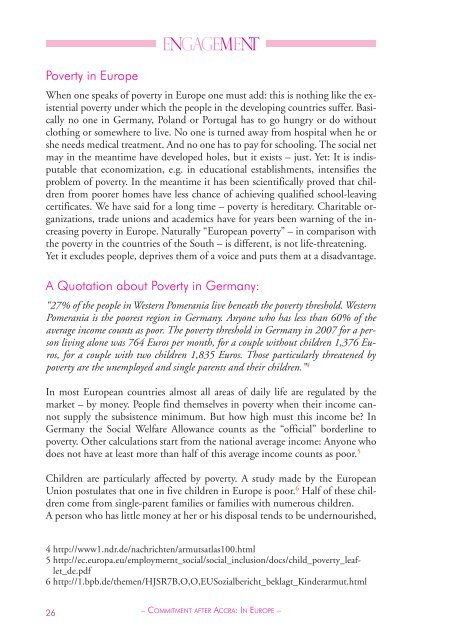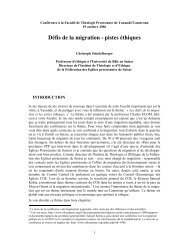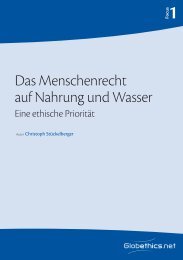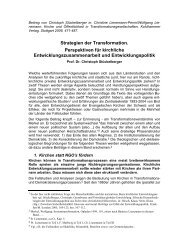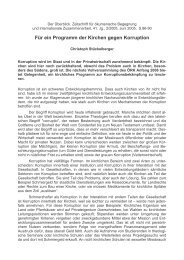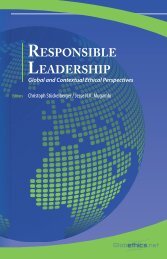BREAK THE CHAINS OF OPPRESION AND THE YOKE OF ...
BREAK THE CHAINS OF OPPRESION AND THE YOKE OF ...
BREAK THE CHAINS OF OPPRESION AND THE YOKE OF ...
You also want an ePaper? Increase the reach of your titles
YUMPU automatically turns print PDFs into web optimized ePapers that Google loves.
Poverty in Europe<br />
EnGAGEMEnT When one speaks of poverty in Europe one must add: this is nothing like the existential<br />
poverty under which the people in the developing countries suffer. Basically<br />
no one in Germany, Poland or Portugal has to go hungry or do without<br />
clothing or somewhere to live. No one is turned away from hospital when he or<br />
she needs medical treatment. And no one has to pay for schooling. The social net<br />
may in the meantime have developed holes, but it exists – just. Yet: It is indisputable<br />
that economization, e.g. in educational establishments, intensifies the<br />
problem of poverty. In the meantime it has been scientifically proved that children<br />
from poorer homes have less chance of achieving qualified school-leaving<br />
certificates. We have said for a long time – poverty is hereditary. Charitable organizations,<br />
trade unions and academics have for years been warning of the increasing<br />
poverty in Europe. Naturally “European poverty” – in comparison with<br />
the poverty in the countries of the South – is different, is not life-threatening.<br />
Yet it excludes people, deprives them of a voice and puts them at a disadvantage.<br />
A Quotation about Poverty in Germany:<br />
“27% of the people in Western Pomerania live beneath the poverty threshold. Western<br />
Pomerania is the poorest region in Germany. Anyone who has less than 60% of the<br />
average income counts as poor. The poverty threshold in Germany in 2007 for a person<br />
living alone was 764 Euros per month, for a couple without children 1,376 Euros,<br />
for a couple with two children 1,835 Euros. Those particularly threatened by<br />
poverty are the unemployed and single parents and their children.” 4<br />
In most European countries almost all areas of daily life are regulated by the<br />
market – by money. People find themselves in poverty when their income cannot<br />
supply the subsistence minimum. But how high must this income be? In<br />
Germany the Social Welfare Allowance counts as the “official” borderline to<br />
poverty. Other calculations start from the national average income: Anyone who<br />
does not have at least more than half of this average income counts as poor. 5<br />
� � � � �<br />
Children are particularly affected by poverty. A study made by the European<br />
Union postulates that one in five children in Europe is poor. 6 Half of these children<br />
come from single-parent families or families with numerous children.<br />
A person who has little money at her or his disposal tends to be undernourished,<br />
4 http://www1.ndr.de/nachrichten/armutsatlas100.html<br />
5 http://ec.europa.eu/employmernt_social/social_inclusion/docs/child_poverty_leaflet_de.pdf<br />
6 http://1.bpb.de/themen/HJSR7B,O,O,EUSozialbericht_beklagt_Kinderarmut.html<br />
������������������������������������������������<br />
� � � � ��������������������� �<br />
26<br />
– COMMITMENT AFTER ACCRA: IN EUROPE –


